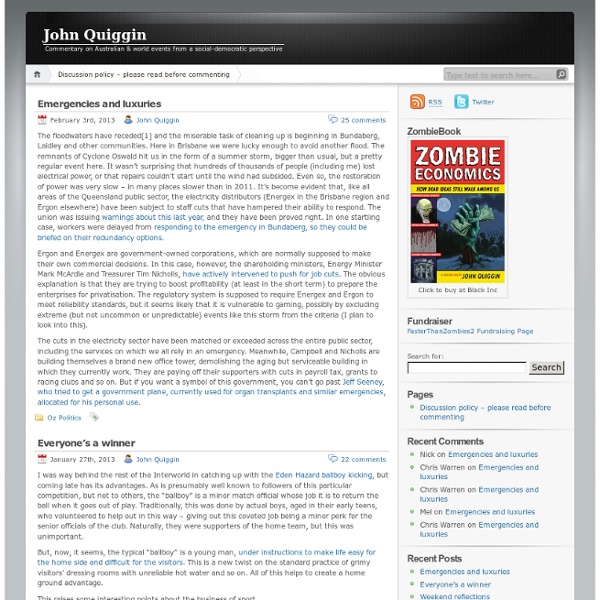



How I Became a Keynesian Until last September, when the banking industry came crashing down and depression loomed for the first time in my lifetime, I had never thought to read The General Theory of Employment, Interest, and Money, despite my interest in economics. I knew that John Maynard Keynes was widely considered the greatest economist of the twentieth century, and I knew of his book's extraordinary reputation. But it was a work of macroeconomics--the study of economy-wide phenomena such as inflation, the business cycle, and economic growth. Law, and hence the economics of law--my academic field--did not figure largely in the regulation of those phenomena. We have learned since September that the present generation of economists has not figured out how the economy works. Baffled by the profession's disarray, I decided I had better read The General Theory. The General Theory is a hard slog, though not because it is mathematical. The lag can retard economic growth. And workers are not fungible.
Economics One Climate Debt Denial Climate Debt Denial Art by Roger Peet At the height of the Washington feeding frenzy about the fiscal cliff, the debt ceiling, and sequestration, austerity hawks coined a new label to denigrate lawmakers who were opposed to cutbacks brought on by the cynical manipulation of national debt: “debt deniers.” Missing from the jousting on Capitol Hill was any mention of climate debt, yet there was plenty of evidence of its unwanted presence. This past year finally saw the climate change threat acknowledged by the world’s leading international finance institutions. In addition, both the IMF and the World Bank have acknowledged that the brunt of the impact will be borne by some of the poorest populations in the world, further jeopardizing their prospects for sustainable development. The debt trap has been a familiar outcome of neoliberal policies such as structural adjustment since the 1970s, but it also builds directly on patterns established through centuries of colonial extraction.
KeithHennessey.com | Your guide to American economic policy Les distributions de dividendes plombent l’investissement des entreprises Les résultats du CAC 40 pour 2013 soulignent encore une fois combien le coût du capital pèse sur le tissu productif français : avec des profits en baisse de 8 %, les grandes entreprises augmentent leur distribution de dividendes de 6 %, au détriment de l’investissement. En 2013, les entreprises du CAC 40 ont réalisé 48 milliards d’euros de profits, en diminution de 8 % par rapport à 2012. La croissance en panne dans la zone euro, le ralentissement des pays émergents, l’appréciation de l’euro et des dépréciations d’actifs se combinent pour expliquer ces moins bonnes performances. Pour autant, les actionnaires de ces entreprises vont ressortir gagnants de cette baisse de forme puisque les dividendes progressent de 6 % pour s’établir à 39 milliards d’euros. 85 % des profits partent en dividendes Est-ce une année exceptionnelle ? 2,6 fois plus de dividendes que d’investissements !
Kids Prefer Cheese Economie : la mort programmée du pluralisme à l’Université Les imposteurs de l’économie sont de retour. S’ils se sont faits discrets au plus fort de la crise financière, les voilà assurément de retour. Depuis quelques temps, ils tiennent même de nouveau le haut du pavé. C’est en 2012 que j’avais mené l’enquête sur ces « Imposteurs de l’économie », dans un livre portant ce titre (Editions Gawsewitch), qui s’appliquait à marcher sur les brisées du célèbre documentaire américain Inside Job. Or mon enquête, ainsi que d’autres travaux, ont indéniablement produit leur effet. Pendant quelques temps, donc, mes imposteurs de l’économie ont donc rasé les murs. Erreur ! Les indices les plus graves, c’est l’Association française d’économie politique (Afep), présidée par l’économiste André Orléan, qui les a présentés, jeudi 13 mars, à l’occasion d’une conférence à l’Assemblée nationale. Mais enfin ! Voici cette enquête : Et du même coup, on devine la conséquence de cette tendance mortifère. Pour l’Afep, un sursaut est donc indispensable. Eh bien non !
jka on economics UK The UK is in a liquidity trap, a situation where monetary policy is unable to stimulate the economy either through lowering of interest rates or increasing money supply. Liquidity traps occur when rates are reduced to the zero bound or thereabouts and cannot be reduced further. In real terms UK rates (base rate minus inflation) are negative 4%. The liquidity trap is compounded when expectations of adverse events, either deflation or in the current situation, a lack of aggregate demand, are manifest. Firms are loathe to invest, households are constrained to spend, government spending is limited by a desire to resolve the debt crisis. The first round of Quantatitive Easing was essential to improve liquidity in the banking system at a time of crisis. This is not an argument for more asset purchases, for the exercise came at a price. Ten year gilt yields have fallen to 2.4% and thirty year gilt yields have fallen to 3.5%. In 2008, I wrote : Welcome to planet ZIRP.
Les millionnaires réunis à Davos reconnaissent que les riches nuisent à la démocratie Le Forum de Davos s’est achevé samedi 25 janvier. Les membres du club oligarchique le plus connu de la planète se sont accordés sur un point : les riches abiment la démocratie. Le "Forum économique mondial" s’est tenu comme chaque année à Davos. Ce rassemblement de responsables de multinationales - qui payent plus de 20 000 euros leur inscription -, agrémenté de décideurs politiques et de journalistes économiques, est la manifestation la plus visible du caractère oligarchique qu’est devenu le système politique sous le capitalisme. Les débats qui occupent ces journées reflètent l’évolution des esprits des dirigeants de ce monde. En entrée du débat auquel participait notamment Joseph Stiglitz, l’animatrice a donné le résultat du sondage fait auprès des participants. Réponse sans ambiguïté : à 64 %, oui. Les riches sont donc tout à fait conscients de l’évolution oligarchique du système. Pour voir la video du débat : World economic forum Source : Reporterre. Lire aussi : Vive la crise !